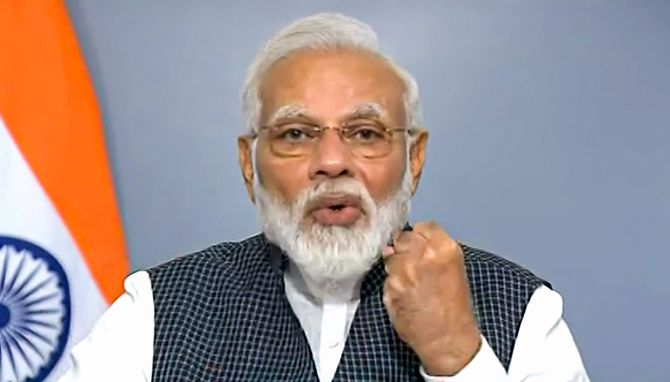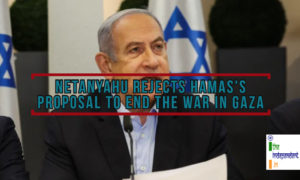
Abrogation of Article 370 opens road to development – Modi
The Prime Minister of India – Narendra Modi has addressed the nation for the first time, after the repealing of Articles 370 and 35A in Jammu & Kashmir, in a televised speech on late night of Thursday, i.e., August 8, 2019.
During his address, he urged the political parties opposing the abrogation of Article 370 and 35A to think beyond the political differences and work together towards the holistic development of Kashmir.
For the records, the Jammu and Kashmir (Reorganisation) Bill, 2019, which has already been passed by the Parliament, has ended the special status given to Jammu to Kashmir and converts it into a Union Territory (U.T.) with legislature. Besides, Ladakh would also be converted into a U.T. without legislation.
In his 38 minutes speech, Modi said, “It’s only natural that some people support this decision while there are others who dispute it and it’s our responsibility to address these issues. But I want to appeal to you to act in national interest; cooperate with us to take Jammu & Kashmir-Ladakh in a new direction and respect the sentiments of the country.”
He further added, “Who voted in Parliament or who did not, who supported (the Bill) or who did not; we must move beyond all this and work together for the people of Jammu & Kashmir and Ladakh.”
He also promised the people of Jammu & Kashmir that elections will be held in the region very soon. He even said that there is an opportunity for the youth of Kashmir to become a Member of Legislative Assembly (MLA).
He highlighted the fact that over the years, Pakistan has used Articles 370 and 35A as a tool to invoke hatred amongst the people of Kashmir against India. He also assured that he will make Kashmir a terror-free territory. He stated that the U.T. arrangement is only for some time and it may change if development of Kashmir takes place at a faster rate than he has envisioned.
Talking about benefits, he mentioned that the perks and facilities offered to Government employees will now be extended to Kashmir.
“We have taken the step to make J&K a UT after a lot of thought. Understand the reason behind it: Under governor’s rule, J&K was directly in touch with the Centre, and good governance and better development were seen on the ground. Earlier, schemes were drawn up only on paper. But now, these were being rolled out on the ground for the first time. Projects delayed for years have now picked up pace. We ushered in a new work culture in J&K,” said Modi.
He cited that Government has to take some security measures due to which people are facing problems. However, these steps are required to ensure peace in the valley. In addition, he quoted that the Government is ensuring that people face no difficulty on the occasion of Eid-Ul-Adha on Monday, i.e., August 12, 2019.
In his address, he clearly said that with the repealing of Articles 370 and 35A, the dreams of leaders like late Shri Atal Bihari Vajpayee, Bhim Rao Ambedkar and Sardar Patel have been realised.
Apart from this, he also spoke on how Articles 370 and 35A never promoted any growth and only resulted in dynasty politics and terrorism. Criticising the Articles, he said, “It was never discussed during all these years what damage had been caused by both the Articles to the people of J&K. Nobody could pinpoint what benefit these Articles had brought to the people. These Articles only gave terrorism, dynasty politics and widespread corruption to J&K.”
He concluded his address by saying that the steps taken by his Government will make Kashmir an important player in the overall economic development of India.
The Shimla Agreement
Separately, the Secretary-General of the United Nations – Antonio Guterres has went back to invoke the Shimla Agreement after the Prime Minister of Pakistan – Imran Khan approached U.N. over India’s latest move.
The Shimla Agreement was signed in Shimla by the then Prime Minister of India – Indira Gandhi and the then Prime Minister of Pakistan – Zulfiqar Ali Bhutto on July 2, 1972. The Shimla Agreement contains a set of guiding principles, mutually agreed to by India and Pakistan, which both sides would adhere to while managing relations with each other. The key highlights of the agreement are:
• A mutual commitment to the peaceful resolution of all issues through direct bilateral approaches
• To build the foundations of a cooperative relationship with special focus on people to people contacts
• To uphold the inviolability of the Line of Control in Jammu and Kashmir, which is a most important CBM between India and Pakistan, and a key to durable peace
It is to be noted that India has faithfully observed the Shimla Agreement in the conduct of its relations with Pakistan.
Besides, Guterres has called on both India and Pakistan to refrain from taking steps that could hamper peace in the region.







